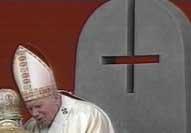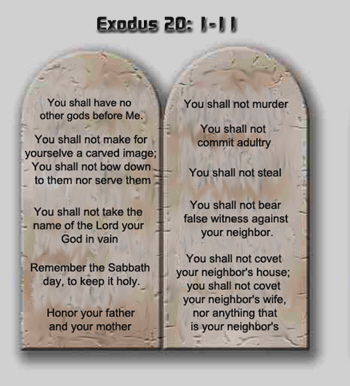As long as I have been presenting this evidence of Creation, of God and any thing clearly proven by the scientific facts at hand, I have been ridiculed and cut down in my intelligence INSTEAD of personal investigation being done by those who fear this evidence, this alone proves me right and them wrong solely because of their clear fear of the evidence.
Whenever I come across evidence from Evolution I first think this must mean something.
Of course I don't believe that Evolution is that answer but at the same time I investigate what it could mean, that's the true nature of Science to investigate what happens NOW to prove what could have happened back then, at the dawn of creation.
Whenever I come across evidence from Evolution I first think this must mean something.
Of course I don't believe that Evolution is that answer but at the same time I investigate what it could mean, that's the true nature of Science to investigate what happens NOW to prove what could have happened back then, at the dawn of creation.
For those who read here, there must be civility in our discourses or there is no point in communicating at all because this insulting and name-calling for the sake of avoiding the proof is SIMPLY Childish NONSENSE that is not scientific at all.
If you cannot accept the clear evidence presented because of what your peers would say or what others believe, you are not worthy of the truth. Accepting real truth requires us to drop anything that opposes that truth including Religious and Scientific presumptions that run crosswise of the facts!
Many today are confused and dismayed with the huge amount of Dogmas in many forms making the salvation of God muddled with man-made ideas and rituals that God never intended.
The point is, we could believe ALL the right Doctrines about God and still NOT be saved!
Is it even possible to know the difference between them anymore?
Can I be saved while I'm surrounded by false doctrines and concepts from the mind of the demonic realm?
Am I a Christian if I simply believe every good doctrine about God?
Spiritual Refining: The Anatomy of True and False Conversion
Hell's Best Kept Secret / True & False Conversion (Premiere Series, Living Waters Publications) (2-VHS in case)True biblical Salvation has NEVER CHANGED from day one, just as God is the SAME yesterday, today and forever ....the only thing that has changed and is changing is OUR view of its simple straight forward transparency.
yesterday, today and forever ....the only thing that has changed and is changing is OUR view of its simple straight forward transparency.
James 1:17 (Amplified Bible)
17 "Every good gift and every perfect ([a]free, large, full) gift is from above; it comes down from the Father of all [that gives] light, in [the shining of] Whom there can be no variation [rising or setting] or shadow cast by His turning [as in an eclipse]."
Salvation was not meant to be complicated or confusing but receivable at the lowest level of life to the highest level of human existence.
The problem is not the Doctrines themselves, though they are deadly it is, in the end how we perceive them internally,that really brings us into bondage!
How doctrine is delivered to us determines everything, if doctrine is force feed it simply produces false obedience and death!
BUT if that same doctrine is accepted through reasoning of the mind and spiritual joyfulness it produces the fruit of the Spirit in our lives!
God made salvation so simple that we actually need HELP to mess it up, a help Satan is more than willing to give!
The question is: "Do your dogmas control every fiber of your existence from your mental to your physical reactions?"
If dogmas invented by men and NOT GOD control you then you are NOT thinking for yourself, you are NOT free, you are being Brainwashed!
If on the other hand if the Doctrine in scripture flows from the Spirit of God there is NO brainwashing BUT rather "Mind Renewing" a restructuring of the process of thought so that our reasoning is in line with God's thoughts!
Definition of
brainwashing':
Translation of a Chinese term indicating
"a forcible indoctrination to induce someone to give up basic political, social, or religious beliefs and attitudes and to accept contrasting regimented ideas."
Source: Webster's New Collegiate Dictionary
A remarkable thing about cult mind control is that it's so ordinary in the tactics and strategies of social influence employed.
They are variants of well-known social psychological principles of compliance, conformity, persuasion, dissonance, reactance, framing, emotional manipulation,
and others that are used on all of us daily to entice us to buy, to try, to donate, to vote, to join, to change, to believe, to love, to hate the enemy.
Cult mind control is not different in kind from these everyday varieties, but in its greater intensity, persistence, duration, and scope.
One difference is in its greater efforts to: block quitting the group, by imposing high exit costs, replete with induced phobias of harm, failure, and personal isolation.
Source: Phillip G. Zimbardo, Ph.D., What Is The Message Behind Today's Cults?
"True Doctrine comes from ABOVE to us, false doctrine comes from our perceptions of what we think God meant to say."
Doctrine CANNOT in itself save anyone, doctrines are after all just words from men or on a page. It is what WE do with them and how we do it that defines both our doctrines and us.
Doctrine MUST be placed in a "spiritual container" of words in order to be fully released for change, confession is that container.
Words are spiritual by nature and must be in a spiritual place of obedience just as a "physical seed" must be placed in the dirt and watered in order to grow!
False or true, doctrine works the same. Perception of the false can be so close to the truth, but missing it just by that little fact, the fact our perceptions cannot witness because we have predetermined our out comes using a false positive.
We think we know all about it, but we only see what our flesh is comfortable living with. That's the real point here, the real TRUTH is so far beyond our comfortable zones, beyond our small thoughts, and beyond our incomplete understanding of God!
Doctrine must be understood from God's point of view downward not from our point of view upward, we have gotten religion completely backwards and Satan prospers because of it.
100% of false doctrine happens as a result of misunderstanding the original intent of the writers of scripture!
Can a person living in deception from a scriptural sense be saved and go to heaven?
How often have I asked God that after speaking to a Mormon or Jehovah's Witness, they seem so sincere in their beliefs! But think about it, so were the prophets of Baal whom God destroyed with fire!
I am not speaking of honest scriptural mistakes we all make, but of purposeful mishandling of the Bibles doctrines, thus the people UNDER the ones in charge will have a better chance of being saved if the Truth is shown to them!
It takes a lot more to please God than being sincere or good, you MUST be in complete Obedience to the "letter of his word" not using it as a personal opinion that your church teaches, that would be taking away or adding to scripture.
Remember God and his Word are ONE and the same, so if you follow God and are slack concerning his word, then its the same as NOT following GOD at all!
"It is most evident that every form of false belief TURNS the Cross on its head!
No Change is good when it comes to the TRUTH!"
True Christian Conversion...What Causes it?
by David A. DePra
What causes real Christian conversion?
No.
I'm getting at something which occurs before any of that.
I'm asking what it is that causes a person who is dead in sin, and has no interest in God, to turn and reach out to Him?
Jesus said, "No man can come to Me except the Father who sent Me draw Him." (John 6:44)
Thus, we see that it is GOD who must initiate a process which results in a person embracing Christ as Saviour.
But how does God do this?
What does He use?
What pushes a person from being uninterested in Christ, to wanting Him?
What draws people to Christ for conversion?
Here's another way of approaching the same question:
"The Laws of God lead to TRUE Salvation!"
On Monday I am not a Christian. On Tuesday, I hear a message and embrace Christ as Saviour.
What made me able, or willing, to now
embrace a message which I'd probably heard hundreds of times before?
And how about my neighbor?
On Monday he was an unbeliever.
On Tuesday he was sitting right beside me and heard the same message I heard about Jesus Christ. Yet it did not move Him.
What happened in me that did not happen in him?
And WHY did it happen to me and not to him?
The answer here is, "God called me." But of course, God called me. That's clear.
But the question is, HOW?
What happened in me?
The question becomes more profound once we realize that God never overrides our free will. He doesn't FORCE Christ on anyone, BUT he does sometimes force circumstances around us SO WE WILLINGLY MAKE A CHOICE .
So however God calls a person has to be in line with thatfact. Yet God does call people to Christ, and they respond fully by their own free will.
No one is saying that it is possible for any of us to know all of the details of our calling.
Who can know the mind of the Lord?
Indeed, we don't even know ourselves. But we can know general principles.
And that is the discussion here .

What is the cause of true Christian conversion?
How does God accomplish it?
The Importance:
Why is this question important?
Why must we know how God calls and converts a person to Christ?
Well, first of all, we do NOT need to know it to be saved.
In fact, we don't even need to know it to walk with God.
There are many other facets of Truth which can carry us on with Christ. But Truth always sets us free.
Free from ERROR.
And if we can discover how God converts a person to Christ, we will also discover much other related Truth.
We may also find out that we have been under
"Not everyone who claims to be "Saved" really is saved, there are "Apostates" and deceived church goers who THINK they are but are simply religious people"
The problems in the world today are because deception is Rising?
As Christians, we are going to come into contact with many people who are not believers.
We are also going to come into contact with many people who profess Christ, but who perhaps are not truly converted. We need to understand what we are dealing with so that we can walk in love, in God's purpose, regarding them.
There is something else, too.
We need to examine ourselves.
Understanding this Truth about our own conversion can help us deepen our appreciation for Jesus Christ, and can help us shed some of the error which may have attached itself to us regarding unbelievers and believers alike.
It is not our responsibility to look at any person and decide whether they are saved. That's God's business.
But we can and should know HOW God saves people so that we can properly preach the Truth and guide those who are interested in the right path.
One can never go wrong knowing the Truth about God.
Doctrines and Christianity
Today, many of us are under the notion that in order to be saved,
all that we need to do is agree to a list of doctrines.
Of course, these "doctrines" are Christian doctrines.
They really are.
They include the essential doctrine of Christ --
His virgin birth, death, and resurrection -- and the doctrine of salvation through Him by faith alone.
These ARE doctrines which define Christianity.
If we have become converted to Christ, we will know and believe that these doctrines are true.
Read that again. Am I saying that you must believe in those doctrines to become a Christian?
NO.
That is not what I said. What I said was this:
If you have become a Christian -- if your conversion is real -- then you WILL believe those doctrines are the Truth.
(Because they will bear witness within your spirit when they agree with the Will of God, the Bible.)
Jonathan Edwards, Religious Affections, and the Puritan Analysis of True Piety, Spiritual Sensation and Heart Religion (Studies in American Religion)
Pocahontas : The True Story of an American Hero and Her Christian Faith
We must see the distinction.
True conversion: A dialogue between Hopeful and Christian, from Bunyan's Pilgrim's progress
Conversion is NOT the result of "God did not ask for "Agreement" he asked for Obedience!"

agreeing that a list of doctrines are true. No. But if I am converted
to Christ, I will agree to those true doctrines. I will know thay are the Truth because I know HIM.
I will know the doctrines are the Truth because I have experienced that Truth.
Jesus Christ is real. The new birth is real. And it is because these are real that they can be defined in doctrinal form.
Gospel Behind Bars: True Stories of Prison Revival
Twice-born men;: True conversion records of 100 well-known men in all ranks of life
But just as a written description of a person is not THE person, so doctrines about Christ -- as true as they are -- are nevertheless not the very PERSON. Our faith is to be in HIM -- in Christ -- not in the true doctrines and teachings about Him.
Of course it is never a matter of being saved before I learn any doctrines, or of learning all doctrine before I am saved. Usually there is a mix.
A link too many: A tract on true and false conversion and assurance
But the point is:
Knowing the doctrine of conversion
to Christ is NOT the same thing as BEING CONVERTED.
We must not mistake our knowledge of something as an experience of it.
Many Christians do make this mistake.
We think that because we know a Truth in doctrinal form that we know it the way Jesus meant when He said, "You shall know the Truth, and the Truth shall set you free."
But this is not necessarily so. Jesus was talking about more than the accumulation of facts -- even if they are TRUE facts. He was talking about knowing Truth in a way that alters one's very being.
It is a subtle deception:
Our faith could be in our doctrines
ABOUT Christ, rather than in Christ Himself. It is therefore vital that
we see the difference and avoid the danger.
The apostle James knew of this danger. He said,
"Do you believe that there is one God?
You do well! The devils
also believe and tremble. But know this, O vain man, that faith
without works is dead."
(James 2:19-20)
The fact is, the Devil knows Jesus Christ is Lord. He knows that
Jesus is the Saviour of the world. Indeed, if he did NOT know this
he would not be fighting against it.
Yet what we find is that the Truth
of Jesus is the one thing the Devil seeks to corrupt most of all!
Hardly something possible if he didn't know it was the Truth to begin with!
It is vitally important that all Christians know what they believe, and why. This is most commonly expressed in essential Christian doctrine, backed up by scripture.
It is not.
The best example of this is faith. I can know what faith is, and that I must possess it. But that is a far cry from actually believing and trusting God.
My doctrine may be true. But the Truth of faith may not yet be something which I have yet to experience and live.
In effect, I must not merely possess the Truth.
The Truth must grow to possess ME.
Thus, we come back to the statement made earlier. Giving
agreement to essential Christian doctrine is not a "requirement"for conversion; for salvation.
But if I am converted; am embracing Christ as Lord and Saviour, the RESULT is going to be that I will embrace the doctrines which tell the Truth about Him.
Thank God things work that way!
For if they did not work that way, you are not saved until you can give a detail expository of the doctrines of salvation and justification.
Christianity would be no more than a religion, or a list of beliefs to subscribe to
Notice where all of this is leading:
It leads us to recognize that Christianity is not a mere religion with a list of beliefs which define it.
Rather, Christianity is a relationship with a Person. It is a real and life-changing experience with God through His Son.
Christianity is true conversion; a new birth.
And then because Christianity is all of that, we can explain it through doctrines. But our faith is in a Living Christ who is in us right now -- not in those doctrines.
Misconceptions
There are a number of common misconceptions with regard to true conversion. For instance, many people think that if they are "in a church," that they are automatically "in Christ."
In other words, really converted. But in reality, we are "in the church" only if we are FIRST in Christ and FIRST truly converted. Actually, if just this one Truth were realized, it would eliminate many of the reasons that cults are able to control people.
People would see that their relationship with God is not contingent upon a group or a leader. It is a one-on-one relationship solely because of Jesus Christ, and not in any way dependent upon others in the Body of Christ.
Thus, true conversion is not caused by, or maintained, by my church. Neither by any teacher or leader. I belong to God FIRST, and am converted by HIM.
The rest falls into place as a by-product and nothing more.
The Intellect
Another misconception is that we are somehow converted by study. The more I study, especially if I get a degree, the more spiritual I am. The more holy I am.
The more I know facts about the Bible, and about Jesus, the more I am qualified to lead others.
Going hand in hand with this nonsense is the notion that the way we are to convert others is by argumentation.
By logic.
If we win the argument, we think we have won the person.
But nothing could be further from the Truth.
Christian conversion is not the outcome of a logical argument.
It is not a matter of being painted into a verbal corner and not being able to escape. I do not become a Christian because I have intellectually or logically concluded that it MUST be the Truth.
Does that seem shocking?
It's true.
Think about it.
Any set of beliefs which are the outcome of logical deduction or debate simply exist within the bounds of those arguments.
All that it takes to overthrow those beliefs is a better argument. In those cases, a person's "faith" is only as strong as their argument.
In effect, my faith would be IN my argument. It would be IN my intellectual grasp of the Truth. But Christianity transcends all of that. At the basis of Christianity is not an argument. At the basis is a moral accountability before God, and the solution in Christ.
Thus, faith in Christianity is not in my argument or list of doctrines. It is in a Person, Jesus Christ. It is wonderful to be able to discuss and explain the Truth using logical and intellectual means.
But we don't GET the Truth that way. We don't become converted that way. Rather, we express the Truth that way, if this happens to be in keeping with our particular gifts and personality
The fact is, to try to base Christianity on logic or the intellect is nothing more than fighting on the terms of the enemy. There is nothing wrong or evil with the mind or the intellect. But is cannot breach the chasm between God and man and bring true conversion.
Another big mistake the modern church has made is to try to prove Christianity through historical proof. Yes, there is historical proof to point to.
This can serve a purpose by getting people who rely on that sort of thing to seek further for a personal relationship with Jesus Christ. But in the final analysis, I can convert no one by showing them historical proof.
Why?
Can't history convert people to Christ?
No.
It can only prove to them that He existed. It can even prove to them that He was raised from the dead. But even that -- yes, even that -- cannot convert anyone TO Christ.
Thus, true conversion is not the outcome of a history lesson, any more than it is the outcome of a debate in ethics and logic.
None of that stuff can result in a new birth. None of it can bringrepentance. None of it can bring the words "Jesus is Lord" to the lips of a person.
Thou Art the Christ
It is amazing how clearly the Bible answers all of our questions,
and even the objections of skeptics. All we have to do is look. The
issues are addressed in the Word of God.
Take conversion for example. The issue as to how God converts
is addressed again and again. One of the best examples is found in
Matthew 16. There Jesus asked a question which is THE question
all of us must ask. He asked, "Who do men say that I am?"
The disciples told Him who men were saying He was. John the
Baptist, Jeremiah, or one of the prophets. But then Jesus asked,
"Who do YOU say that I am?"
Peter was the one, as usual, who stepped forward. He said, "After
these many years of study, I have earned my doctorate from the
University of Jerusalem. And I have studied many other ancient
religions. I have learned HOW to read these ancient manuscripts.
And after all of that, I, Dr. Peter, have concluded that You are most likely the Christ, the Son of the living God. But we will keep the issue open in the event of new discoveries."
Assessing the New Testament Evidence for the Historicity of the Resurrection of Jesus (Studies in the Bible and Early Christianity)
Is that how the conversation went? Hardly. Peter simply confessed, "Thou are the Christ, the Son of the Living God." But what really speaks to the point is the response of Jesus. Did He tell Peter, "Books and study have revealed this to you!"
No. Did He say, "Wow, Peter, you are really smart.
You finally figured it out. You must have quite the logical mind."?
The Bible is true;: The lessons of the 1925-1934 excavations in Bible lands summarized and explained
No.
Did He say, "Great Peter. Perhaps now you ought to get a Master's degree so that you can have papers to verify that you really know this."?
No.
What Jesus said, IF WEWOULD SIMPLY READ IT, tells us that there is really only one way to true conversion: God has to reveal Christ to us. Period.Peter had walked and talked with Christ for 3 years. He knew him as a man.
Yet Jesus Christ said THAT was not what revealedto Peter that He was the Christ. NOTHING of the flesh and blood
realm did it. Only the Father in heaven.
Incidentally, this is precisely why Jesus did not walk around the
country side saying, "I am God, I am God...." It would have done
no good -- although there are over a half a dozen places where Jesus does say He is God.
Rather than take that approach, Jesus knewHe simply needed to preach the Truth and do good works. God did the revealing to those He was at that time calling.
What does all of this say to US? It tells us that there isn't any
possible way we are going to see who Jesus Christ is by mere study.
There isn't any way to see it only by reasoning and logic.And it tells us for sure that, when all is said and done, there is no
way to prove to someone else that Jesus Christ is God. We can
and should preach that He is God. But only as an expectation to the one only way in which a Person can come to see who Jesus is: By way of revelation from God Himself.
If Peter, who walked and talked with Christ, did not see who Jesus
was through the means of anything physical, or flesh and blood, then who are WE? God had to reveal Jesus to Peter. He must reveal it to us. And when He does, it will be real.
It will also be something we cannot reveal to others through flesh and blood means. We need to stop trying, and simply focus on doing what God said to do:
Preach the Truth. Let God use it to reveal Christ.
How Does God Convert?
Well, God has a multitude of specific ways of bring a person to the point of surrender
to Christ. But regardless of the method, the issue of conversion hinges on one thing.
And it is the SAME for all. No one is excepted.
What is that one thing?
Just this:
God reveals to us Jesus Christ. And THAT results in two things: First, I see that I am a totally helpless sinner. And I see that He is the answer. Or to say it another way, conversion comes when I repent of my unbelief and finally embrace Jesus Christ for deliverance and salvation.
So that's the answer:
I must see I am a sinner. Then, because of that, I repent of unbelief and surrender to Christ. There is no other way to become a Christian.
The fact is, if I have not seen I am a sinner in need of the grace,and repent of my unbelief, and embrace Christ on that basis, I am NOT converted. I am not born again. I cannot be.
Why?
Because if you don't see you are a sinner, you will not see you need a Saviour. Oh, you might acknowledge there IS a Saviour. And you might agree to the doctrine which says you have a sin nature, and that says you need a Saviour. But unless you actually SEE and KNOW you are a sinner, and repent, your conversion is not real. It can't be.
We are saved by grace through faith. And try though I may, I cannot have faith if I have NOT seen my need. I cannot. There will be nothing to motivate me. I will have no frame of reference for the grace of God. It will remain mere doctrine to me.
A Moral Issue
What all this means is that conversion is NOT an intellectual issue. It is not an emotional issue. It is a MORAL issue. We are here talking about my personal accountability to God. It is there that God must begin with us. It is there that God must meet us: In our sin. And through the Christ who died for us.
Today there are many people -- including many church leaders -- who will tell you that what Jesus taught was wonderful. They will say we must follow the teachings of Jesus Christ. But lost in the shuffle is the very place Christ meets us: In our sin. In our need.
Many Christians do not want to be told they are sinners. To many, that is a negative message. It is depressing. Or it is just for the first five minutes of conversion.
But the fact is, if I embrace Christ, I am going to spend the rest of my life realizing how much I need Him.
And it won't be depressing. That's because my focus won't be on my sin and my need.
It will be on HIM. We ought to be thankful that conversion is a moral issue. If it were not, but instead were an intellectual issue, then the smarter we were, the more holy we'd be. It would mean that no longer does a little child enter the kingdom. Only the intellectual giants do.
Unfortunately, many churches believe this.
They don't come right out and say it, but they believe study and the intellect is what matters most.
And we have, as the body of Christ, paid the price for being so deceived.
The New Testament requirements for church leadership have been almost completely ignored today by most denominations.
Instead of actually reading what Paul said about this important
issue, we simply side-step this and rely on education.
So now we go to a seminary to acquire the spiritual gift of "pastor." And if you
have a doctorate, when then you REALLY have the gift. Such
thinking is foreign to the New Testament.
Education is not evil.
But we should keep it in it's place. It has
nothing to do with a MORAL relationship with God. All of the Bible education in the world cannot equal death and resurrection in Jesus
Christ. It cannot bring repentance and conversion.
Moral Surrender
Jesus never told us to check our brains at the door if we want to enter the kingdom of God. But the intellect cannot bridge the chasm from the flesh to the Spirit. It cannot penetrate through to the Truth.
Listen to the words of the apostle Paul on this matter:
For Christ sent me not to baptize, but to preach the gospel: not with wisdom of words, lest the cross of Christ should be made of no effect.
For the preaching of the cross is to them that perish foolishness; but unto us which are saved it is the power of God. For it is written, I will destroy the wisdom of the wise, and will bring to nothing the understanding of the prudent. (I Cor. 1:17-19)
What makes these words all the more significant is the fact that Paul himself was one of the most intelligent people God ever used.
Read the epistles. Do those letters sound like the writings of a person who never did any thinking?
Hardly. Yet Paul is able to say without apology that it is not his arguments or his wisdom with words which is the key. It is the Cross. It is Jesus Christ. It is the power of God.
Paul makes it clear what the balance is between using one's mind, and true Christian conversion. The intellect and the mind are not the tools which convert you. But they are the tools which, after you meet
Jesus Christ, can be used to understand and explain and proclaim that conversion. And the reason that our minds are able to eventually understand the things of God is only because they have been renewed by the Holy Spirit.
"I beseech you therefore, brethren, by the mercies of God, that you present your bodies a living sacrifice, holy, acceptable unto God,which is your reasonable service.
Note the progression: First, surrender. Unconditional and total.
Then, as the result of that surrender, a stand against becoming conformed to this world. And then, because I have surrendered, the Holy Spirit will renew my mind according to the mind of Christ.
The end result? I will prove what is the good, and acceptable, and perfect will of God.
The vital thing to see is that surrender comes first. It is a MORAL surrender. A surrender to God through Jesus Christ as a sinner in need of the grace of God. Then, as we move forward in faith and obedience, comes the renewal of the mind. Only then comes the real understanding.
Often today, we get the cart before the horse. We think that if we intellectually understand, then we've got it. No.
We may have merely memorized Biblical doctrine, or the teachings of our favorite saint.
We may have nothing personal of Jesus Christ. Imagine yourself planning to take a trip into a far country. You have never been there before.
So you do much reading about it.
In fact, you do so much reading about it that you could probably convince someone you have lived there for many years. You have all the facts and the stats. You can even add detailed descriptions of this land which you have never seen.
Ask:
Is the ability to do all of that the same as having been in that land? Of course not. You have to actually go to the land before you can truly see. And then -- once you see -- then you can understand and explain through experience.
Agreeing that we must repent of sin isn't the same AS repenting of it. Agreeing that Jesus is Lord isn't the same AS surrendering to Him AS Lord. We must not only know how to explain conversion.
We must BE converted.
Paul summed it up best. He said:
Read that again. Notice what God is saying here. He is saying that it is entirely possible to be "ever learning" but NEVER come to know the Truth.
And He is not talking about an atheist. He is talking about those who are religious. For He says in the same passage, in reference to the same people:
"Having a form of godliness, but denying the power thereof."
(II Tim. 3:5a)
The Early Church
About two thousand years ago, about 120 people gathered together in Jerusalem to wait. The atmosphere was somewhat tense. They were in danger. But they were also looking forward to what was going to happen.
What made the atmosphere even more tense was that they did not really know what was going to happen, but simply knew that SOMETHING was going to happen.
Jesus had told them not to depart from Jerusalem, but to "Wait for the promise of the Father."
He had told them, "You shall be baptized with the Holy Spirit not many days hence."
He had also said, "You shall receive power once the Holy Spirit has come upon you. And you shall be My witnesses both in Jerusalem, in Judea, and to the uttermost parts of the earth." (see Acts 1:4-8)
The fact is, there was no way that any of these people could have possibly had the slightest notion of what any of that really meant. "Holy Spirit? What's that?," they probably questioned. "Become witnesses for Christ?," they may have muttered, "How do we do that?"
Their perplexity is seen in the very last question they had asked Jesus. Immediately before the ascension, they asked, "Will you, at this time, restore the kingdom to Israel?"
If there was one thing Jesus had tried to get across to them for the last three and one-half years, it was that the kingdom He continually spoke of was not a physical kingdom. Over and over He tried to show them this.
He had even said, "The kingdom of God does not come in a way that can be observed with the eyes.
Neither can anyone say, 'Here it is, or there it is!' For, behold, the kingdom of God is within you." (Luke 17:20-21)
Nothing could be plainer.
But these disciples had grown up ina society and culture which knew of only one kind of kingdom: A natural one. A physical one.
It was almost impossible to change their thinking. Even after the death and resurrection of Jesus Christ they did not understand. Even with the resurrected Christ standing in front of them, they didn't get it.
It is therefore certain that when they returned to Jerusalem to wait, they still had not grasped the meaning. They were told to wait.
And they obeyed.
But they likely had no clue as to what they were waiting FOR.
The first disciples had a Jewish background . They had no patterns set for what a church was, or how it should function.
. They had no patterns set for what a church was, or how it should function.
In the Days of Jesus: The Jewish Background and Unique Teaching of JesusThe Jewish Background to the Lord's Prayer
They were a group of scared, inexperienced people, none of whom had ever been to a seminary or school. Yet it was these that God took and used.
They would turn the world upside down.
How did they do it?
And more importantly, why don't we have today what they had then?
Where has all the power gone?
Why aren't Christians today turning the world upside down?
The Early Conversions
In the first century, no one knew about Jesus Christ. Even word about Him had to be carried verbally, or at best, through an epistle.
When one of the apostles walked into a town, it was often a Gentile town. So not only were these people ignorant of Christ, but they had false gods instead.
Quite a few obstacles to overcome. Added to the problem was the fact that these early disciples had no New Testament from which to preach.
In fact, they really had no Old Testament which they could easily carry around. And really, what good would it have done to show the Bible to a Gentile of that time anyways?
We must get this setting. What possible reason, if you wanted to preach Christ to a pagan of that time, could you give him for believing Jesus was his Saviour?
What reason could you give him for believing the Old Testament prophecies?
What reasons could you possibly give them for believing?
Why should they believe you when you tell them Jesus rose from the dead?
Why should they care whether He lived, was crucified, rose, and ascended?
And how are you going to make them care?
Remember that in those days, in that area, there was a Greek domination of the culture. Greeks like to argue, and they like to reason. So we are not merely talking about ignorant heathen who would sit there and let you spoon feed them anything you like. No.
These were heathen people, but smart people. And they had never heard of Jesus Christ.
If you wanted to convert them to the truth, you had better be prepared to answer questions. Today skeptics demand proof, and claim that there is none for Christianity.
But back then, there was even less. There was no written record. But many people WERE converted? How did these early disciples turn the world upside down?
In Acts 8, Philip converted a eunuch.
He preached Jesus to him. At the conclusion, the eunuch confessed, "I believe that Jesus Christ is the Son of God." (Acts 8:37) What convinced this man?
What made him believe the scripture was worth reading, and thatJesus as his Saviour?
A good argument?
No!
What convinced him was a revelation of God. A conviction of need. The work of the Holy Spirit. Lots of people read the Bible and never come to that. This fellow came to surrender to Christ, not because of a good argument, and not because of an intellectual understanding.
He surrendered because "faith comes by hearing and hearing comes by the Word of God." (Rom. 10:17)
Note that faith is only possible IF you have heard, and that hearing is not possible unless it is created by the Word of God.
In effect, WE DON'T DO THIS.
God does. God reveals to a person, after much preparation, the Truth. The Truth about their sin and need for deliverance, and the Truth about Jesus Christ as Lord and Saviour.
True Conversion
In today's environment of "political correctness," many places in the body of Christ have given into the world's mentality. People used to die for Christ. Today we apologize for Him, and adjust Him to suit the preferences of people.








No comments:
Post a Comment
Those who have been redeemed from the Occult, Witchcraft, or any form good or bad of such and know what you believe, please support those who are still in the dark concerning who God is!
Whatever you do here please Testify to it now so everyone can be supported by your obedience to God!